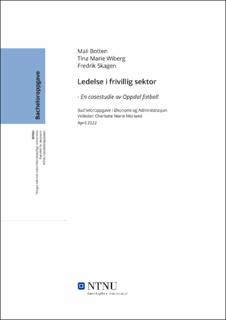| dc.contributor.advisor | Morland, Charlotte Marie | |
| dc.contributor.author | Botten, Mali | |
| dc.contributor.author | Wiberg, Tina Marie | |
| dc.contributor.author | Skagen, Fredrik | |
| dc.date.accessioned | 2022-06-23T17:19:51Z | |
| dc.date.available | 2022-06-23T17:19:51Z | |
| dc.date.issued | 2022 | |
| dc.identifier | no.ntnu:inspera:108383376:110373659 | |
| dc.identifier.uri | https://hdl.handle.net/11250/3000396 | |
| dc.description.abstract | I det norske samfunn står frivillig arbeid svært sterkt, hvorav blant annet idretten i stor grad er avhengig av frivillige deltakere. Året 2022 er spådd til å være frivillighetens år, og arbeid innenfor den frivillige sektoren er derfor et dagsaktuelt tema. Denne bacheloroppgaven vil derfor omhandle ledelse, og da mer spesifikt hvordan styret i den frivillige organisasjonen Oppdal fotballklubb utøver ledelse. I 2014 innførte Norges Fotballforbund kvalitetsklubbkonseptet, og dette gjorde at fotballklubbene fikk flere krav å forholde seg til, deriblant kursing av trenere og ledere. På bakgrunn av at kvalitetsklubbkonseptet gjorde at det ble stilt større krav til fotballklubbene, synes vi derfor det vil være interessant å undersøke hvordan dette kan utspille seg innenfor en frivillig organisasjon. Målet med denne bacheloroppgaven er å besvare følgende problemstilling: «Hvordan utøver styret i Oppdal fotballklubb ledelse når de må ta hensyn til kompetansekrav i den frivillige sektoren?».
Teoriene som danner grunnlaget for denne bacheloroppgaven er transformasjonsledelse av James McGregor Burns, og et nyere perspektiv av Bernhard Bass. I tillegg har vi brukt deler av teamledelse, ved å se på studien til Carl E. Larson og Frank M. J. LaFasto, og deres åtte karakteristikker på vellykkede team.
Metoden vi benyttet oss av i denne oppgaven er kvalitativ metode, da denne metoden vil gi oss et bilde på en gitt situasjon fra respondentenes perspektiv. Vi har intervjuet tre respondenter som alle er en del av styret til Oppdal fotballklubb. Perspektivet på den situasjonen vi undersøker vil derfor være et ledelsesperspektiv. Funnene som ble gjort gjennom disse intervjuene er analysert og drøftet opp imot transformasjonsledelse og de åtte karakteristikkene på vellykkede team. Det blir fra respondentene tydelig at de aktivt jobber med en overordnet visjon som legger føringer på deres arbeidsoppgaver, ved at de blant annet har et verdisett de jobber ut ifra. For at dette skal være gjennomførbart fokuserer ledelsen på relasjonsbygging til deltakerne, da det er en faktor som styret vektlegger mye i sitt arbeid. I tillegg virker det som at styret har iverksatt flere ulike tiltak for å styrke kursdeltakelsen, slik at de skal beholde sertifiseringen som kvalitetsklubb, men også for å ha gode forutsetninger for å tilby best mulig aktivitet til barn og unge. Et annet viktig funn er at respondentene opplever at det kan være problematisk å engasjere deltakere i frivillige styreverv. | |
| dc.description.abstract | Voluntary work has a strong foothold in Norwegian society, where sports among other things, rely heavily on volunteers. The year 2022 is predicted to be the year of voluntary work, so work within the voluntary sector is therefore a current topic. This bachelor thesis will therefore deal with leadership, more specifically how the board of the voluntary organization Oppdal football club executes leadership. The Norwegian Football Association adopted the quality club concept in 2014, which meant that football clubs had to satisfy a number of standards, for example regarding coaches and leaders. Given that the quality club concept resulted in increased demands on football clubs, we think it will be interesting to study how this can unfold within a voluntary organization. We therefore seek to answer the following question: “How does the board of Oppdal football club exercise leadership when they have to take into account competence requirements in the voluntary sector?”.
This bachelor thesis is based on the theories of transformational leadership by James McGregor Burns and a more recent perspective by Bernhard Bass. In addition, we incorporated aspects of team leadership from the research of Carl E. Larson and Frank M. J. LaFasto, including their eight characteristics of team excellence.
The approach we utilized in this thesis is a qualitative method, which will provide us with a picture of a specific circumstance from the respondents´ point of view. We questioned three responders, all of whom members of the Oppdal football club´s board of directors. As a result, the viewpoint on the topic we are studying will be leadership. These interviews´ conclusions are reviewed and discussed in relation to transformational leadership and the eight characteristics of team excellence. It is obvious from the responses that they are actively working win an overarching vision that provides parameters for their job activities, in that they have a set of values on which they base their work. To make this possible, leadership concentrates on developing connections with the participants, as this is a component that the board places a high value on in its job. Furthermore, it appears that the board has implemented a number of different measures to increase course participation, not only so that they can keep their certification as a quality club, but also so that they can provide the best possible activity to children and young people. Another significant conclusion is that respondents believe it might be difficult to engage people in voluntary board roles. | |
| dc.language | nob | |
| dc.publisher | NTNU | |
| dc.title | Ledelse i frivillig sektor | |
| dc.type | Bachelor thesis | |
